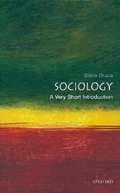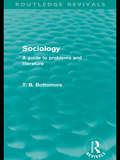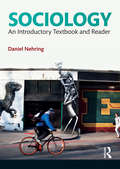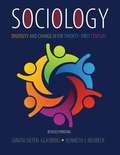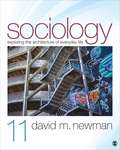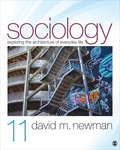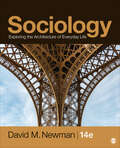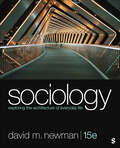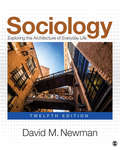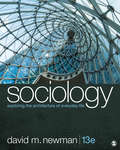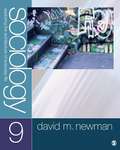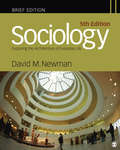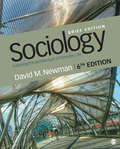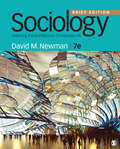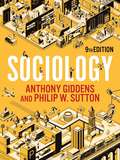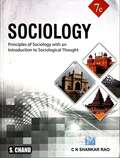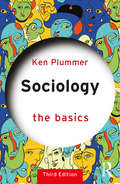- Table View
- List View
Sociology: A Very Short Introduction
by Steve BruceSteve Bruce conveys the essence of the field of sociology in this fascinating volume. A well-known populizer of the discipline, Bruce presents here an introduction to a way of thinking that will appeal to anyone interested in deepening their understanding of modern society. Bruce reasserts the value of sociology as a social science, as a framework of understanding the human condition that grounds its explanations in reliable observations of the real world. Drawing on studies of social class, crime and deviance, work in bureaucracies, and changes in religious and political organizations, Bruce explores the tension between the individual's role in society and society's role in shaping the individual. Sociology: A Very Short Introduction demonstrates the value of sociology as a perspective for understanding the modern world.
Sociology: A guide to problems and literature (Routledge Revivals)
by Tom B. BottomoreFirst published in 1962, this seminal work is an introduction to sociology in a world context, and a sophisticated guide to the major themes, problems and controversies in contemporary sociology. The book remains unique in its organisation and presentation of sociological ideas and problems, in it s lack of insularity (its wide coverage of diverse types of society and of sociological thought from various cultural traditions), and in its systematic connection of sociology with the broad themes of modern social and political thought.
Sociology: An Introductory Textbook and Reader
by Ken Plummer Daniel NehringThis groundbreaking new introduction to sociology is an innovative hybrid textbook and reader. Combining seminal scholarly works, contextual narrative and in-text didactic materials, it presents a rich, layered and comprehensive introduction to the discipline. Its unique approach will help inspire a creative, critical, and analytically sophisticated sociological imagination, making sense of society and the many small and large problems it poses.
Sociology: Diversity and Change in the Twenty-First Century
by Davita Glasberg Kenneth NeubeckSociology: Diversity And Change In The Twenty-first Century studies the social structure, the organization and operations within society.
Sociology: Exploring the Architecture of Everyday Life
by David M. NewmanIn this Eleventh Edition, the author continues to show students how to see the "unfamiliar in the familiar"--to step back and see organization and predictability in their take-for-granted personal experiences. With his approachable writing style and lively personal anecdotes, the author's goal since the first edition has been the same: to write a textbook that "reads like a real book. " Newman uses the metaphors of "architecture" and "construction," to help students understand that society is not something that exists "out there," independently of them; it is a human creation that is planned, formed, maintained, or altered by individuals.
Sociology: Exploring the Architecture of Everyday Life
by David M. NewmanIn Sociology: Exploring the Architecture of Everyday Life, Eleventh Edition, David M. Newman continues to show students how to see the “unfamiliar in the familiar”—to step back and see organization and predictability in their take-for-granted personal experiences. With his approachable writing style and lively personal anecdotes, the author’s goal since the first edition has been the same: to write a textbook that “reads like a real book.” Newman uses the metaphors of “architecture” and “construction,” to help students understand that society is not something that exists “out there,” independently of them; it is a human creation that is planned, formed, maintained, or altered by individuals. Using vivid prose, current examples, and fresh data, this text presents a unique and thought-provoking overview of how society is constructed and experienced. Instead of surveying every subfield in sociology, the more streamlined coverage focuses on the individual and society, the construction of self and society, and social inequality in the context of social structures.
Sociology: Exploring the Architecture of Everyday Life
by David M. NewmanIn the Fourteenth Edition of Sociology: Exploring the Architecture of Everyday Life, David Newman shows students how to see the "unfamiliar in the familiar"—to step back and see organization and predictability in their take-for-granted personal experiences. With his approachable writing style and lively anecdotes, the author’s goal from the first edition has been the same: to write a textbook that "reads like a real book." Many adopters of this book are fans of Peter Berger′s classic works, which helped introduce the idea of "social constructionism" to sociology. Newman uses the metaphors of "architecture" and "construction" to help students understand that society is not something that exists "out there," independently of themselves; it is a human creation that is planned, maintained, or altered by individuals. Using vivid prose, current examples, and fresh data, this text presents a unique and thought-provoking overview of how society is constructed and experienced. Instead of surveying every subfield in sociology, the more streamlined coverage (14 chapters) focuses on the individual and society, the construction of self and society, and social inequality in the context of social structures. This title is accompanied by a complete teaching and learning package. Contact your SAGE representative to request a demo. Digital Option / Courseware SAGE Vantage is an intuitive digital platform that delivers this text’s content and course materials in a learning experience that offers auto-graded assignments and interactive multimedia tools, all carefully designed to ignite student engagement and drive critical thinking. Built with you and your students in mind, it offers simple course set-up and enables students to better prepare for class. Learn more. Assignable Video with Assessment Assignable video (available with SAGE Vantage) is tied to learning objectives and curated exclusively for this text to bring concepts to life. Watch a sample video now. LMS Cartridge: Import this title’s instructor resources into your school’s learning management system (LMS) and save time. Don’t use an LMS? You can still access all of the same online resources for this title via the password-protected Instructor Resource Site. Learn more.
Sociology: Exploring the Architecture of Everyday Life
by David M. NewmanIn the Fourteenth Edition of Sociology: Exploring the Architecture of Everyday Life, David Newman shows students how to see the "unfamiliar in the familiar"—to step back and see organization and predictability in their take-for-granted personal experiences. With his approachable writing style and lively anecdotes, the author’s goal from the first edition has been the same: to write a textbook that "reads like a real book." Many adopters of this book are fans of Peter Berger′s classic works, which helped introduce the idea of "social constructionism" to sociology. Newman uses the metaphors of "architecture" and "construction" to help students understand that society is not something that exists "out there," independently of themselves; it is a human creation that is planned, maintained, or altered by individuals. Using vivid prose, current examples, and fresh data, this text presents a unique and thought-provoking overview of how society is constructed and experienced. Instead of surveying every subfield in sociology, the more streamlined coverage (14 chapters) focuses on the individual and society, the construction of self and society, and social inequality in the context of social structures. This title is accompanied by a complete teaching and learning package. Contact your SAGE representative to request a demo. Digital Option / Courseware SAGE Vantage is an intuitive digital platform that delivers this text’s content and course materials in a learning experience that offers auto-graded assignments and interactive multimedia tools, all carefully designed to ignite student engagement and drive critical thinking. Built with you and your students in mind, it offers simple course set-up and enables students to better prepare for class. Learn more. Assignable Video with Assessment Assignable video (available with SAGE Vantage) is tied to learning objectives and curated exclusively for this text to bring concepts to life. Watch a sample video now. LMS Cartridge: Import this title’s instructor resources into your school’s learning management system (LMS) and save time. Don’t use an LMS? You can still access all of the same online resources for this title via the password-protected Instructor Resource Site. Learn more.
Sociology: Exploring the Architecture of Everyday Life
by David M. NewmanUsing vivid prose, current examples, and fresh data, the?Fifteenth Edition?of?Sociology: Exploring the Architecture of Everyday Life?presents a unique and thought-provoking overview of how society is constructed and experienced. Author David M. Newman shows students how to see the "unfamiliar in the familiar"—to step back and see organization and predictability in their take-for-granted personal experiences. With his approachable writing style and lively anecdotes, Newman′s goal from the first edition has been the same: to write a textbook that "reads like a real book." Many adopters of this book are fans of Peter Berger′s classic works, which helped introduce the idea of "social constructionism" to sociology. Newman uses the metaphors of "architecture" and "construction" to help students understand that society is not something that exists "out there," independently of themselves; it is a human creation that is planned, maintained, or altered by individuals.
Sociology: Exploring the Architecture of Everyday Life
by David M. NewmanUsing vivid prose, current examples, and fresh data, the?Fifteenth Edition?of?Sociology: Exploring the Architecture of Everyday Life?presents a unique and thought-provoking overview of how society is constructed and experienced. Author David M. Newman shows students how to see the "unfamiliar in the familiar"—to step back and see organization and predictability in their take-for-granted personal experiences. With his approachable writing style and lively anecdotes, Newman′s goal from the first edition has been the same: to write a textbook that "reads like a real book." Many adopters of this book are fans of Peter Berger′s classic works, which helped introduce the idea of "social constructionism" to sociology. Newman uses the metaphors of "architecture" and "construction" to help students understand that society is not something that exists "out there," independently of themselves; it is a human creation that is planned, maintained, or altered by individuals.
Sociology: Exploring the Architecture of Everyday Life
by Dr David M. NewmanIn Sociology: Exploring the Architecture of Everyday Life, Eleventh Edition, David M. Newman continues to show students how to see the “unfamiliar in the familiar”—to step back and see organization and predictability in their take-for-granted personal experiences. With his approachable writing style and lively personal anecdotes, the author’s goal since the first edition has been the same: to write a textbook that “reads like a real book.” Newman uses the metaphors of “architecture” and “construction,” to help students understand that society is not something that exists “out there,” independently of them; it is a human creation that is planned, formed, maintained, or altered by individuals. Using vivid prose, current examples, and fresh data, this text presents a unique and thought-provoking overview of how society is constructed and experienced. Instead of surveying every subfield in sociology, the more streamlined coverage focuses on the individual and society, the construction of self and society, and social inequality in the context of social structures.
Sociology: Exploring the Architecture of Everyday Life
by Dr David M. NewmanIn Sociology: Exploring the Architecture of Everyday Life, David M. Newman shows students how to see the "unfamiliar in the familiar"—to step back and see organization and predictability in their take-for-granted personal experiences. With his approachable writing style and lively personal anecdotes, the author's goal from the first edition has always been the same: to write a textbook that, in his words, "reads like a real book." Newman uses the metaphors of "architecture" and "construction," to help students understand that society is not something that just exists "out there," independently of themselves; it is a human creation that is planned, maintained, or altered by individuals. Using vivid prose, examples from current events, and the latest research findings, this fully updated Twelfth Edition presents a unique and thought-provoking overview of how society is constructed and experienced. Instead of surveying every subfield in sociology, the more streamlined coverage focuses on the individual and society, the construction of self and society, and social inequality in the context of social structures.
Sociology: Exploring the Architecture of Everyday Life
by Dr David M. NewmanIn Sociology: Exploring the Architecture of Everyday Life, David M. Newman shows students how to see the "unfamiliar in the familiar"—to step back and see organization and predictability in their take-for-granted personal experiences. With his approachable writing style and lively personal anecdotes, the author's goal from the first edition has always been the same: to write a textbook that, in his words, "reads like a real book." Newman uses the metaphors of "architecture" and "construction," to help students understand that society is not something that just exists "out there," independently of themselves; it is a human creation that is planned, maintained, or altered by individuals. Using vivid prose, examples from current events, and the latest research findings, this fully updated Twelfth Edition presents a unique and thought-provoking overview of how society is constructed and experienced. Instead of surveying every subfield in sociology, the more streamlined coverage focuses on the individual and society, the construction of self and society, and social inequality in the context of social structures.
Sociology: Exploring the Architecture of Everyday Life
by Dr. David M. NewmanIn Sociology: Exploring the Architecture of Everyday Life, David Newman shows students how to see the &“unfamiliar in the familiar&”—to step back and see organization and predictability in their personal experiences. With his approachable writing style and lively personal anecdotes, the author&’s goal from the first edition has been the same: to write a textbook that &“reads like a real book.&” Many adopters of this book are fans of Peter Berger's classic works, which helped introduce the idea of "social constructionism" to sociology. Newman uses the metaphors of &“architecture&” and &“construction,&” to help students understand that society is not something that exists &“out there,&” independently of themselves; it is a human creation that is planned, maintained, or altered by individuals. Using vivid prose, current examples, and fresh data, the Thirteenth Edition presents a unique and thought-provoking overview of how society is constructed and experienced. Instead of surveying every subfield in sociology, the more streamlined coverage (14 chapters) focuses on the individual and society, the construction of self and society, and social inequality in the context of social structures.
Sociology: Exploring the Architecture of Everyday Life
by Dr. David M. NewmanIn Sociology: Exploring the Architecture of Everyday Life, David Newman shows students how to see the &“unfamiliar in the familiar&”—to step back and see organization and predictability in their personal experiences. With his approachable writing style and lively personal anecdotes, the author&’s goal from the first edition has been the same: to write a textbook that &“reads like a real book.&” Many adopters of this book are fans of Peter Berger's classic works, which helped introduce the idea of "social constructionism" to sociology. Newman uses the metaphors of &“architecture&” and &“construction,&” to help students understand that society is not something that exists &“out there,&” independently of themselves; it is a human creation that is planned, maintained, or altered by individuals. Using vivid prose, current examples, and fresh data, the Thirteenth Edition presents a unique and thought-provoking overview of how society is constructed and experienced. Instead of surveying every subfield in sociology, the more streamlined coverage (14 chapters) focuses on the individual and society, the construction of self and society, and social inequality in the context of social structures.
Sociology: Exploring the Architecture of Everyday Life (9th Edition)
by David M. NewmanThis text makes connections between sociology and current trends and events. Most chapters include a photo essay with b&w photos. Chapter learning features include suggestions for real-life activities and informal experiments, plus chapter key points and terms. The student website provides interactive study tools, readings, video and audio links, and journal articles. This ninth edition refers to recent political, historical, and cultural events and technology. Some statistical tables have been changed to more readable charts and graphs. The boxed features on sociologists at work and micro-macro connections have been updated. Newman is affiliated with DePauw University. Annotation ©2012 Book News, Inc. , Portland, OR (booknews. com)
Sociology: Exploring the Architecture of Everyday Life, Brief Edition
by Dr David M. NewmanAdapted from David M. Newman’s best-selling Sociology: Exploring the Architecture of Everyday Life, this briefer, streamlined version continues to show students how to see the “unfamiliar in the familiar,” inspiring them to think critically about their own lives and social contexts. As in the full text, the author’s approachable writing style and lively personal anecdotes make the Brief Edition a text that “reads like a real book.” It uses the metaphors of “architecture” and “construction” to help students understand that society is not something that exists “out there,” independently of themselves; it is a human creation that is planned, formed, maintained, or altered by individuals. Rather than surveying every subfield in sociology, the Brief Edition focuses on the individual and society, the construction of self and society, and social inequality in the context of social structures.
Sociology: Exploring the Architecture of Everyday Life, Brief Edition
by Dr David M. NewmanAdapted from David M. Newman’s best-selling Sociology: Exploring the Architecture of Everyday Life, this briefer, streamlined version continues to show students how to see the “unfamiliar in the familiar,” inspiring them to think critically about their own lives and social contexts. As in the full text, the author’s approachable writing style and lively personal anecdotes make the Brief Edition a text that “reads like a real book.” It uses the metaphors of “architecture” and “construction” to help students understand that society is not something that exists “out there,” independently of themselves; it is a human creation that is planned, formed, maintained, or altered by individuals. Rather than surveying every subfield in sociology, the Brief Edition focuses on the individual and society, the construction of self and society, and social inequality in the context of social structures.
Sociology: Exploring the Architecture of Everyday Life, Brief Edition
by Dr David M. NewmanThis new Brief Sixth Edition of David Newman’s text is the streamlined version of Sociology: Exploring the Architecture of Everyday Life with the same goal: to be a textbook that, in the author’s words, "reads like a real book." Newman shows to see the “unfamiliar in the familiar”—to step back and see organization and predictability in their take-for-granted personal experiences. Newman uses the metaphors of “architecture” and “construction,” to help students understand that society is not something that exists “out there,” independently of themselves; it is a human creation that is planned, maintained, or altered by individuals. Instead of surveying every subfield in sociology, this text focuses on the structural features of society, the social construction of self and identity, and social inequality in the context of social institutions. The new edition includes examples and analysis of contemporary events and trends, including: The changes in our national politics brought about by the 2016 presidential election Increasing societal attention paid to fatal encounters between police and unarmed people of color or incidents of sexual harassment and assault School shootings and the debates over gun ownership The continued dramatic growth of communication technology, particularly social networking sites
Sociology: Exploring the Architecture of Everyday Life, Brief Edition
by Dr David M. NewmanThis new Brief Sixth Edition of David Newman’s text is the streamlined version of Sociology: Exploring the Architecture of Everyday Life with the same goal: to be a textbook that, in the author’s words, "reads like a real book." Newman shows to see the “unfamiliar in the familiar”—to step back and see organization and predictability in their take-for-granted personal experiences. Newman uses the metaphors of “architecture” and “construction,” to help students understand that society is not something that exists “out there,” independently of themselves; it is a human creation that is planned, maintained, or altered by individuals. Instead of surveying every subfield in sociology, this text focuses on the structural features of society, the social construction of self and identity, and social inequality in the context of social institutions. The new edition includes examples and analysis of contemporary events and trends, including: The changes in our national politics brought about by the 2016 presidential election Increasing societal attention paid to fatal encounters between police and unarmed people of color or incidents of sexual harassment and assault School shootings and the debates over gun ownership The continued dramatic growth of communication technology, particularly social networking sites
Sociology: Exploring the Architecture of Everyday Life: Brief Edition
by Dr. David M. NewmanIn this brief edition of Sociology: Exploring the Architecture of Everyday Life, David Newman shows you how to see the &“unfamiliar in the familiar&”—to step back and see predictability in your personal experiences. Through his approachable writing style and lively personal anecdotes, the author stays true to his goal of writing a textbook that &“reads like a real book.&” Newman uses the metaphors of &“architecture&” and &“construction,&” to illustrate that society is a human creation that is planned, maintained, and altered by individuals. In the Seventh Edition of this bestseller, you can use the most updated statistical information combined with contemporary examples to explore the individual and society, the construction of self and society, and social inequality in the context of social structures.
Sociology: Exploring the Architecture of Everyday Life: Brief Edition
by Dr. David M. NewmanIn this brief edition of Sociology: Exploring the Architecture of Everyday Life, David Newman shows you how to see the &“unfamiliar in the familiar&”—to step back and see predictability in your personal experiences. Through his approachable writing style and lively personal anecdotes, the author stays true to his goal of writing a textbook that &“reads like a real book.&” Newman uses the metaphors of &“architecture&” and &“construction,&” to illustrate that society is a human creation that is planned, maintained, and altered by individuals. In the Seventh Edition of this bestseller, you can use the most updated statistical information combined with contemporary examples to explore the individual and society, the construction of self and society, and social inequality in the context of social structures.
Sociology: Introductory Readings
by Anthony Giddens Philip W. SuttonThe indispensable guide to understanding the world we make and the lives we lead. This thoroughly revised and updated ninth edition remains unrivalled in its vibrant, engaging and authoritative introduction to sociology. The authors provide a commanding overview of the latest global developments and new ideas in this fascinating subject. Classic debates are also given careful coverage, with even the most complex ideas explained in a straightforward way. Written in a fluent, easy-to-follow style, the book manages to be intellectually rigorous but still very accessible. With a strong focus on interactive pedagogy, it aims to engage and excite readers, helping them to see the enduring value of thinking sociologically. The ninth edition includes: a solid foundation in the basics of sociology: its purpose, methodology and theories; up-to-the-minute overviews of key topics in social life, from gender, personal life and poverty, to globalization, the media and politics; stimulating examples of what sociology has to say about key issues in our contemporary world, such as climate change, growing inequality and rising polarization in societies across the world; a strong focus on global connections and the ways that digital technologies are radically transforming our lives; quality pedagogical features, such as ‘Classic Studies’ and ‘Global Society’ boxes, and ‘Thinking Critically’ reflection points, as well as end-of-chapter activities inviting readers to engage with popular culture and original research articles to gather sociological insights. The ninth edition sets the standard for introductory sociology in a complex world. It is the ideal teaching text for first-year university and college courses, and will help to inspire a new generation of sociologists.
Sociology: Principles of Sociology with an Introduction to Sociological Thought - Competitive Exam
by C N Shankar RaoThis textbook has been comprehensively written to acquaint the students with the fundamental concepts of Sociology as well as provide an introduction to the diverse aspects of Sociology. Students will be introduced to the origins of Sociology as a discipline and would get to explore relevant topics such as inequality, institutions, control, change, disorganisation and problems in the society. Topics such as applied sociology and sociological thought have also been discussed to give a complete overview of the subject. This textbook not only caters to the requirements of the undergraduate students of Sociology and Law courses but is also a useful reference for postgraduate students and aspirants appearing for various competitive examinations.
Sociology: The Basics (The Basics)
by Ken PlummerA lively, accessible and comprehensive introduction to the diverse ways of thinking about social life, Sociology: The Basics has been translated into six languages. The volume is packed with thought-provoking summaries, questions, quotations and activities. It offers an absorbing narrative about what we mean by the social, and how we can think about it, weaving in discussions of the personal, the political and social change, along with concepts and vivid contemporary examples, and answering questions such as: What is the scope, history and purpose of sociology? How do we cultivate ways of understanding society and ‘the social’? What is the state of the world we live in today? How do we analyse suffering and inequalities? What are key methods and tools for researching and thinking about society? How has digitalism reshaped sociology and its method? How might sociology help us understand the changes brought about by Covid-19? Does sociology have values? What is the role of sociology in making a better world? In this thoroughly revised and updated Third edition the reader is encouraged to think critically about the structures, meanings, histories and cultures found in the rapidly changing world we live in. With tasks to stimulate the sociological mind and suggestions for further reading both within the text and on an accompanying website, this book is essential reading for all those studying sociology and those with an interest in how the modern world works.
